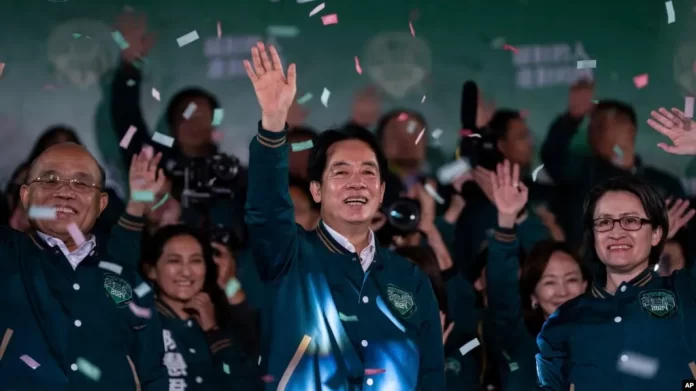TAIPEI – Taiwan’s new president-elect, Lai Ching-te, is likely to face a tough task when he takes office in May as he will have to face the rage of China which has repeatedly denounced him as a dangerous separatist.
Lai, who won the election on Saturday (13/1), repeatedly said in his campaign that he wants to maintain the status quo with China and offered to have a dialogue with Beijing.
“We don’t want to be enemies with China. We can be friends,” Lai, known by his English name William, told a Taiwanese television station in July.
However, in Beijing’s view, Lai, 64, is a separatist and a “troublemaker” for comments he first made when he served as a prime minister in 2017.
At that time Lai spoke of being a “worker” for Taiwan’s formal independence – a red line for Beijing.
The following year, he told parliament that he was a “practical worker for Taiwan’s independence”.
This prompted China’s widely read newspaper Global Times to call for the government to issue an international arrest warrant for Lai and prosecute him under China’s 2005 Anti-Separatist Law.
Lai insisted that all he meant was that Taiwan was already an independent country.
During the campaign, he stuck to President Tsai Ing-wen’s line that the Republic of China – Taiwan’s official name – and the People’s Republic of China are not mutually subservient to each other.
Under Taiwan’s constitution, the Republic of China is a sovereign state, a view shared by all major political parties in Taiwan.
The Republic of China government fled to Taiwan in 1949 after losing a civil war against Mao Zedong’s communists, who established the People’s Republic.
What worries Beijing is the idea that Lai could try to change the status quo by declaring the establishment of the Republic of Taiwan, something Lai says he will not do.
“I think China hates him, really hates him,” said Wu Xinbo, a professor of international relations at Shanghai’s Fudan University.
“This is because if he is elected as Taiwan’s leader, he might come to push the goal of Taiwan independence, which would trigger a crisis across the Taiwan Strait.”
Although China announced sanctions against several senior Taiwanese officials, including Lai’s partner, Hsiao Bi-khim, Taiwan’s former de facto ambassador to the US, Beijing has not applied them to Lai.
It is thought to be because Beijing does not want to completely close the door on dialogue with Lai.
President Xi advised to relax
During the campaign, Lai said that he would follow Tsai’s path of offering to negotiate with China and maintain peace and the status quo.
He also pledged to defend the island and asserted that only his people can determine the island’s future.
Stephen Tan, management director of the International Policy Advisory Group in Taipei, said that Lai’s platform is similar–if not identical–to Tsai.
The president is barred from running for re-election after serving two terms.
Lai came from a humble background in northern Taiwan. He is the son of a coal miner who died when he was a child. As a doctor, he specialized in spinal cord injuries.
He became Tsai’s vice president in 2020 when they won a landslide victory over China’s threats to Taiwan, given Beijing’s crackdown on anti-government protests in Hong Kong.
Since then, China has massively increased military exercises near Taiwan and held war drills in August 2022 and last April in response to Taiwan’s engagement with the US.
Taiwanese officials said earlier that they expect China to seek to exert pressure on the incoming president, including by conducting military exercises near Taiwan, before Lai takes office.
In May, during a Q&A session with students at his alma mater, National Taiwan University, Lai said that the head of state he would most like to have dinner with is Chinese President Xi Jinping, whom he advised to “relax a bit”.
China’s Taiwan Affairs Office said his comments were “strange” and “deceptive”, noting that the “nature of Taiwan’s independence” he spoke of has not changed.
Beijing demands that the Taiwanese government accept that both sides of the Taiwan Strait belong to “one China”, something Tsai and Lai have refused to do.




